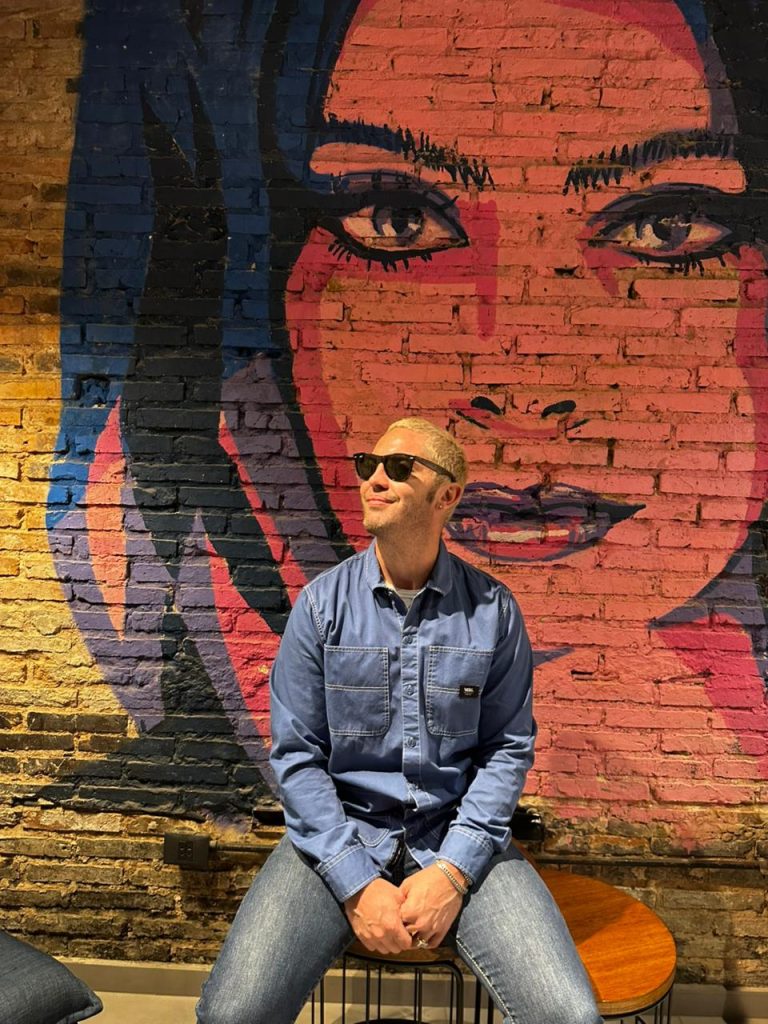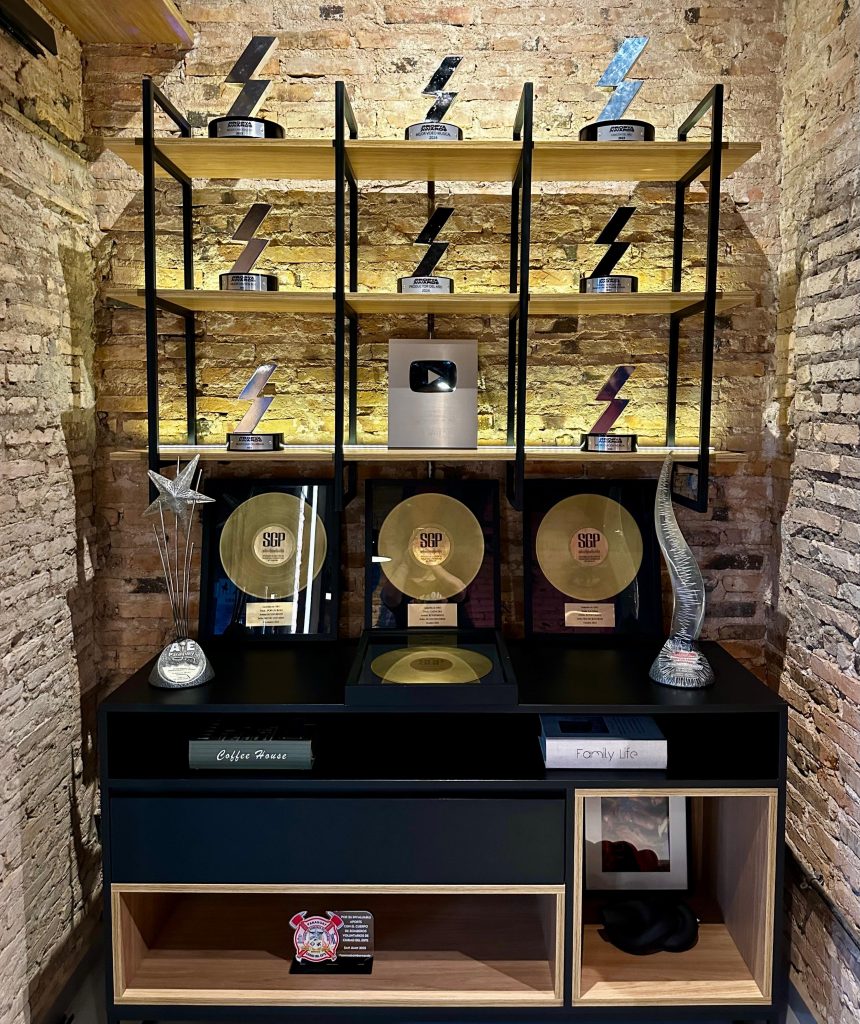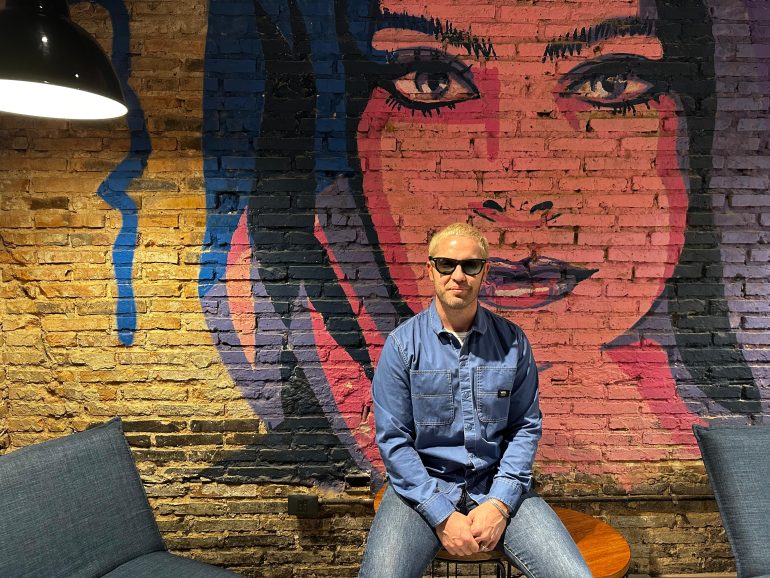The rain taps softly outside 4K, Roberto “Chirola” Ruiz Díaz’s studio in Asunción. Chirola (41) is the lead vocalist of Kchiporros, the hugely popular band that blends pop-Latin, cumbia, and Paraguayan roots, as well as La de Roberto, and a solo artist. Inside, the air is warm, the walls are filled with colour, and soft light turns the space into a refuge from the rain.
Chirola adjusts his iconic glasses and smiles. “This space, where we are sitting, is more than an office,” he says. “4K is a production house, a studio, a booking agency, and a meeting place. It is where people connect freely and ideas take shape.”
Reflecting on nearly two decades of music with measured confidence, he recalls, “In 2006 came Kchiporros. It was a mix of luck and coincidence, and from that moment on, we almost never stopped.” And when asked what title the current chapter of his career might have, he thinks for a moment. “I would call it Incorporating the Lessons. And I am at the middle of the novel.”
The music that made Chirola
“I have childhood memories of sharing music with my father. He had a large collection of Argentine rock and listened to all sorts of things. The cover of Revolver by The Beatles. I will never forget it. I also remember hearing Eric Clapton. Those sounds remain with me. At school, I loved Sublime and Oasis. From Latin America, Café Tacvba, Los Fabulosos Cadillacs, Mano Negra.”
When talking about performing abroad and hearing audiences sing his songs, Chirola smiles fondly. “Each time, it feels more special. Knowing that our songs have become part of Paraguay’s popular songbook fills me with pride. The road has not been easy, those who know our story know we have had highs and lows, moments of transition and change. But we always dared to jump, to take risks, to change how we think about music and life.”
His latest album with Kchiporros, Todo el mundo está Kaliente! (Everyone is Hot!), captures that restless energy.

In front of 60,000 people
He then remembers one of the moments that defined him. “I recall with great affection our first Vive Latino in 2013. We were lucky to be invited, and we opened the main stage on the first day. The venue could hold 60,000 people, and there were already thousands waiting for us. I remember finishing the set and feeling like it was a milestone, but also asking myself, ‘Now what?’ That duality is deep. When you achieve something you have longed for, you suddenly wonder what comes next.”
Roberto “Chirola” Ruiz Díaz, a musician, composer, singer, producer, father, and husband, admits that balancing all these roles is never simple.
“It is hard. You need to find a balance. If you give too much energy to one thing, the others suffer. You must be present during tours, at home, and at the studio. And you must take care of your mental health. If you are not well up here,” he says, touching his temple, “everything collapses.”
Collaborations and new sounds
Collaboration remains a central part of his journey. “I loved Hydro Experimental. From the beginning, I admired their environmental message, giving visibility to something so vital as water.”
On 25 October 2025, Chirola will share the stage once again with Los Auténticos Decadentes at Puerto de Asunción. The concert celebrates the 30th anniversary of Mi Vida Loca (My Crazy Life), Auténticos Decadentes’ record that marked an entire generation.
“It is undeniable that Los Kchis are a consequence of that time. We later found our own voice, but that is where we come from.”
The road ahead for Roberto “Chirola” Ruiz Díaz

The months ahead are filled with plans for touring in Europe. Chirola is also preparing a special live session in one of Asunción’s historic bars. “We are reworking songs from the new album and some classics. We have been rehearsing a lot. It is exhausting, but exciting.”
With La de Roberto, he is also planning new things. “I am in the middle of creating a project that started with Lo Mágico y Lo Místico, our last album, and has evolved into something bigger. The project has become a multidisciplinary, conceptual piece that we are developing together with some colleagues, and we plan to release it next year. The project is completely outside my comfort zone, but artistically very meaningful.”
And his latest experiment blends art and science. “We used electrodes to read brain activity while people listened to music. It was supervised by psychologists and psychiatrists. The goal is to remind people that music can also heal.”
“Legacy Feels Premature”
When asked about his legacy, Chirola smiles. “Feels premature. It brings me too close to death. Yet I know that something is being built, and that some things are already resonating. I hope the good things outweigh the bad, above all, because as human beings we are always learning.”
He continues, “Legacy is also about fighting for your dreams, but it is equally about building teams, fostering conversations, and diving deeply into what you create. You can combine many things: make people dance, make them think, make them feel. Everything is valid.”
Showing Paraguay to the world
Before the interview comes to an end, Chirola shares his thoughts on Paraguay and its place in the world. “It is brilliant that The Asunción Times wants to show Paraguay to an international audience. This country has so much cultural richness, like music, food, nature, and people. For too long, Paraguay has been a hidden secret, isolated by its own history.”
He pauses before adding, “Asunción could be one of Latin America’s greenest and most beautiful capitals, but it is also broken in parts. Still, that is part of its beauty. In the middle of chaos, there is a country with a lot of soul.”
It is a statement that defines not only his view of Paraguay, but also his art: honest, layered, and deeply human.


